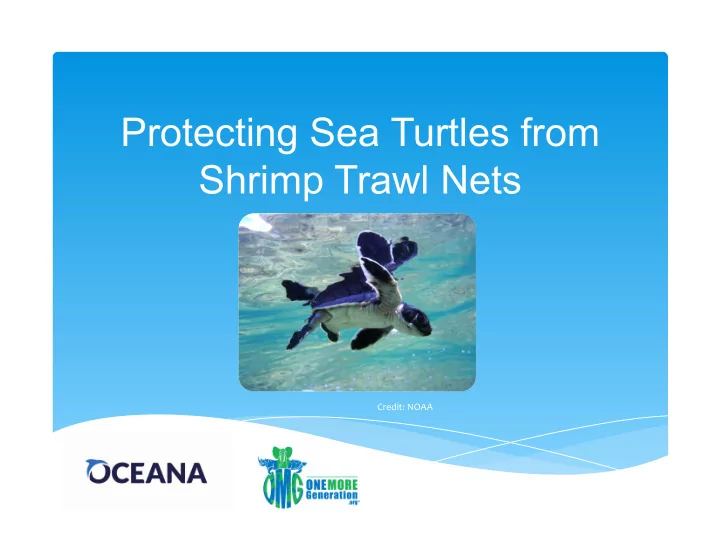

Protecting Sea Turtles from Shrimp Trawl Nets Credit: ¡NOAA ¡
What’s the Problem? Not all shrimp boats are required to use Turtle Excluder Devices (TEDs) * The government estimates that 50,000 sea turtles drown every year in shrimp trawl nets in the South Atlantic and Gulf of Mexico. * While federal regulations require that certain types of nets use Turtle Excluder Devices (TEDs) , not all types are required to do Credit: ¡Oceana/Mar ¡Mas ¡ so.
What About Bycatch? * Bycatch is the catch of non- target fish and ocean wildlife. * The southeast shrimp trawl fishery throws back 64% of what it catches, exceeding 229 million Credit: ¡NOAA ¡ pounds of wasted fish and ocean wildlife annually. * This is as much as 4 times the weight of the State of Liberty!
What’s the Solution? Mandate that all shrimp boats are required to use Turtle Excluder Devices (TEDs) * TEDs are metal grates inserted in trawl nets that allow captured sea turtles to escape.
Do TED’s Work? * When used properly, they are 97% effective at preventing sea turtle deaths in shrimp trawls! * They also allow other large critters such as rays, sharks and larger fish to escape Credit: ¡NOAA ¡
How do TED’s work?
What Else Can Be Done? * Require all shrimp trawls to use TEDs. * Research by the U.S. Fishery Service suggests that reducing the space between a TED’s bars by just 1 inch can reduce fish Bycatch by 25%, or more than 55 million pounds ! It would also allow smaller turtles to escape.
Why are sea turtles important? * Sea turtles help maintain healthy sea grass beds and coral reefs that provide key habitats for other marine life and help balance marine food webs. Credit: ¡NMFS ¡ Credit: ¡USGS ¡
All 5 Species of Sea Turtle in the Southeast are Impacted… Green Leatherback Loggerhead Kemp’s ridley Hawksbill … and all are already listed as endangered or threatened. Credit: ¡Oceana/Eduardo ¡Sorensen; ¡Carlos ¡Minguell; ¡David ¡Plange; ¡Melissa ¡Forsyth; ¡Carlos ¡Suárez ¡
Kemp’s Ridley Sea Turtle * Smallest of the sea turtles * Only about 1,000 breeding females exist worldwide * Nest in mass synchronized groups called arribadas (Spanish for “arrival”) Credit: ¡USEPA ¡ Credit: ¡National ¡Park ¡Service ¡
Leatherback Sea Turtle * Largest of the sea turtles (up to 8 feet and 1,300 lbs) * Instead of a bony shell, they have leathery connective tissue * Can swim more than 10,000 miles every year Credit: ¡Oceana/David ¡Plange ¡ ¡ Credit: ¡USFWS ¡
Loggerhead Sea Turtle * Eggs in a loggerhead nest Credit: ¡NOAA ¡ that is below 82˚F will produce more males , while a nest above 85˚F will produce mostly females * Have callus-like traction scales that allow them to walk on the ocean floor Credit: ¡USFWS ¡
Green Sea Turtle * Name comes from their fat and other internal tissues that are green because of a herbivorous diet of sea grass and algae * Can live for over 80 years * Can lay 200 eggs at a time Credits: ¡NOAA ¡
Hawksbill Sea Turtle * Females return to their natal beaches every 2-3 years to nest * Have been hunted for hundreds of years for their beautiful shell, known as “tortoise shell” * Feed almost exclusively on sponges Credit: ¡NIST ¡
How can you help? * Write a letter to President Obama and Secretary Penny Pritzker telling them why you believe sea turtles should be protected. * Oceana and One More Generation will collect the letters and present them to the U.S. government on World Sea Turtle Day , June 16, 2016.
How can you help? * Download our letter template at the following link: TED Letter Template
How can you help? * You can also download a coloring page for your younger siblings and friends and ask them to send us their picture and comments as well: TED Coloring Page
Please send letters to: ¡ Oceana ¡ ¡ ¡ One ¡More ¡Generation ¡ ¡ Attn: ¡Save ¡Sea ¡Turtles ¡ ¡ Attn: ¡Save ¡Sea ¡Turtles ¡ ¡ 1350 ¡Connecticut ¡Ave. ¡NW ¡ P.O. ¡Box ¡143627 ¡ 5th ¡Floor ¡ ¡ Fayetteville, ¡GA ¡30214 ¡ Washington, ¡DC ¡20036 ¡ ¡ * Visit OneMoreGeneration.org for more information * You can also scan and email your letters and pictures to us at info@onemoregeneration.org or usa.oceana.org/turtles to learn more! Please send by May 23, 2016.
Recommend
More recommend